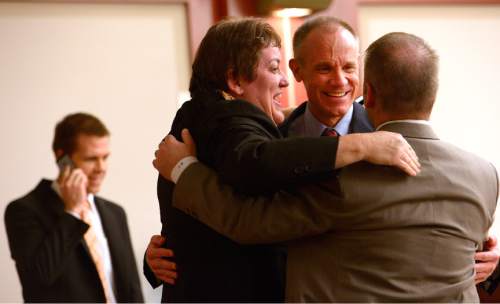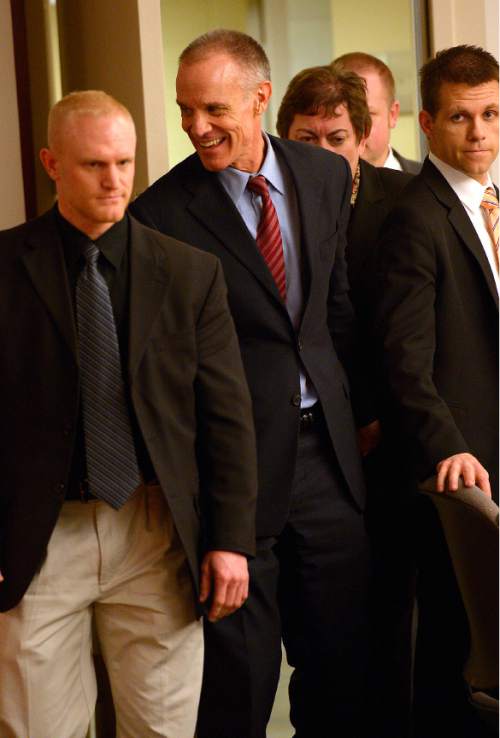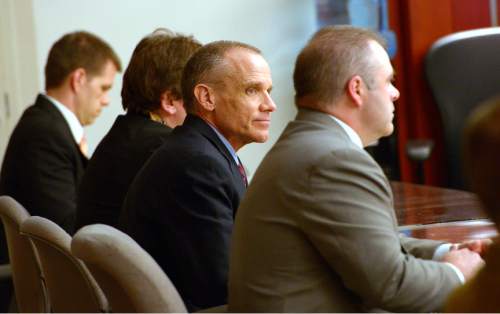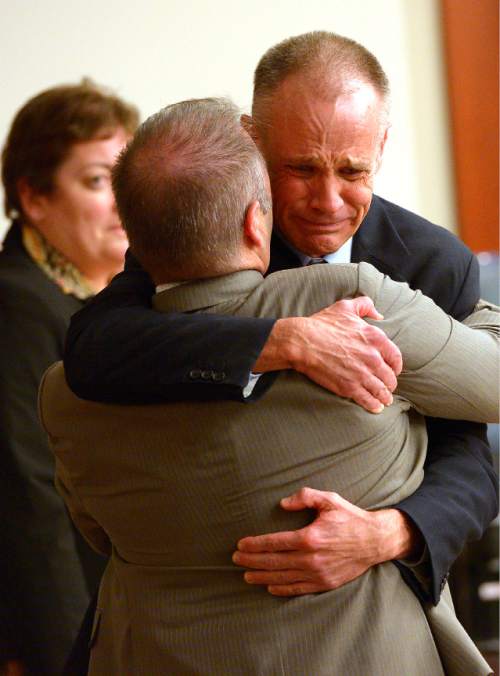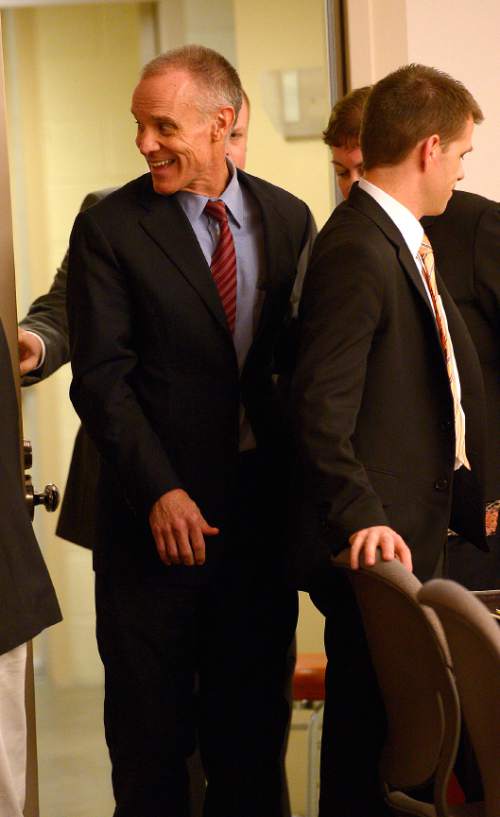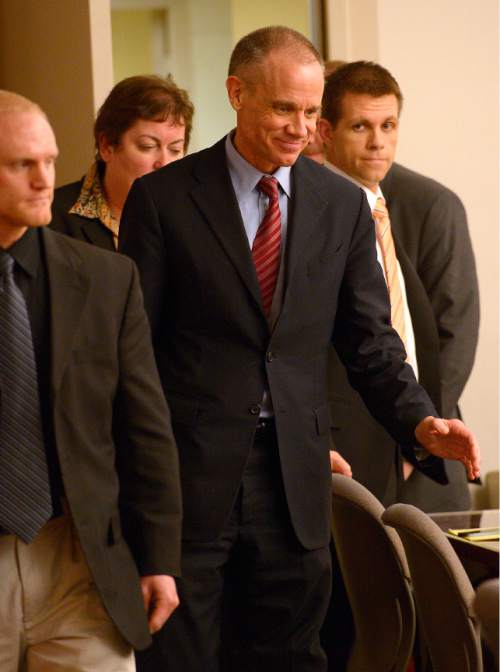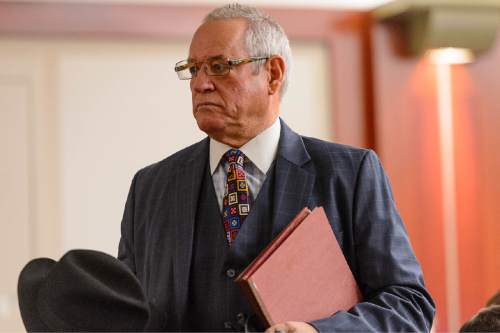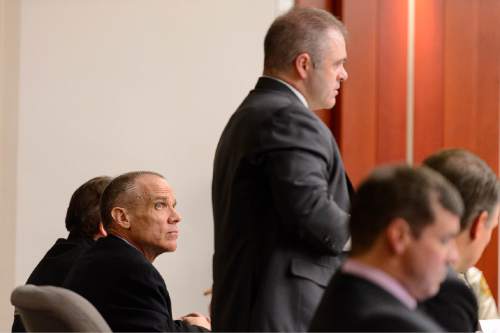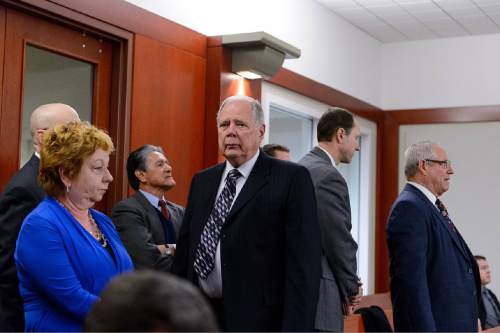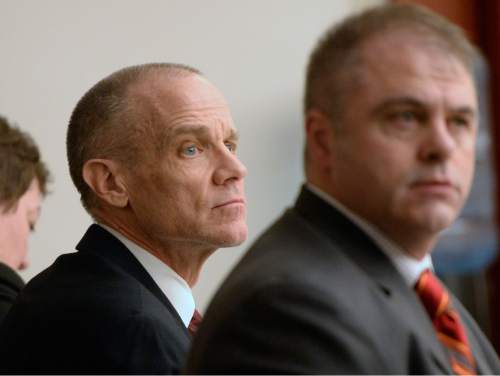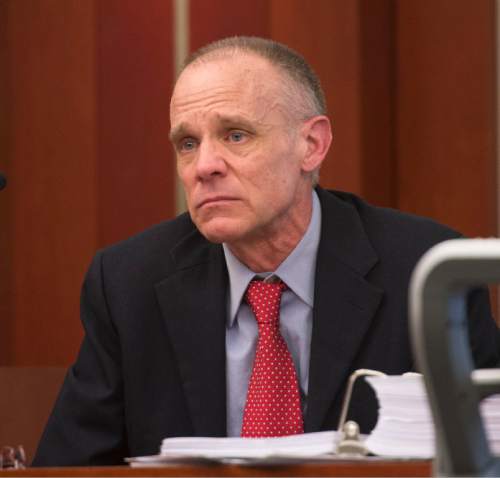This is an archived article that was published on sltrib.com in 2015, and information in the article may be outdated. It is provided only for personal research purposes and may not be reprinted.
A jailed businessman ensnared in the corruption scandal that left two former Utah attorneys general facing criminal charges has asked the state parole board to grant his immediate release from prison, claiming he's been wrongly held for the past four years.
Marc Sessions Jenson contends his incarceration is based on the false statements or omissions by lawyers who worked for ex-Attorneys General Mark Shurtleff and John Swallow, including that he had failed to pay more than $4 million in restitution owed in a 2005 case.
Jenson's petition for release comes in an eight-page letter, which was hand-delivered by his attorneys to the Utah Board of Pardons and Parole last Thursday. It includes 554 pages of exhibits detailing "new and additional" information about Jenson's case — information they say has trickled out during the past two years as part of court filings in a separate 2011 case against Jenson, and in news stories related to the prosecutions of Shurtleff and Swallow.
Jenson also has cooperated with prosecutors investigating the two former GOP officeholders, his attorneys say.
"Given the totality of the exceptional and special circumstances identified herein," the letter states, "the board has overwhelming reason to grant Mr. Jenson's immediate release."
That Jenson, 55, was acquitted in January on eight felony counts of communications fraud and money laundering stemming from his role in the failed Mount Holly resort development near Beaver — a 2011 case that state attorneys argued was grounds for the board to keep Jenson in prison — is also a reason that he should be released, his attorneys say. As an alternative to ordering immediate release, the letter asks the board to hold a special review hearing to consider Jenson's case.
Board hearing officer Jim Hatch confirmed receipt of Jenson's letter. A hearing officer will now review the documents and make a recommendation to the five-member parole board, Hatch said. A decision on any action could take weeks, given the volume of Jenson's petition.
Among the board's options: Grant the request; hold a special attention hearing; or add the new information and documentation to Jenson's file for consideration when he comes before the board at a scheduled parole hearing in August 2016, Hatch said.
On Wednesday, Bridget Romano, the Utah attorney general's incoming civil division chief, said the office had not been contacted by the parole board about Jenson's petition, nor had the office, which also represents the board, been asked for legal advice. So, for the moment, Romano said, she knew of "no immediate plans" to respond or to move to oppose Jenson's release.
"It will be up to the board," Romano said, "to determine whether 47 months meets sufficient service of time."
Jenson, who pleaded no contest to three third-degree felony counts of sale of unregistered securities, has been incarcerated since August 2011, although board guidelines suggested he serve only 14 months.
Board records show that in past reviews, hearing officers found there were aggravating factors that warranted holding Jenson for up to five years — the time Jenson could have served had he been convicted of at least one of the 2005 charges — including his history of similar financial crimes, his role as an organizer of the financial schemes, the extent of the injury caused to victims and his minimization of his own responsibility.
An additional factor in the board's decision: the lack of effort Jenson showed in paying restitution, claims raised by the Utah attorney general's office in 2011, when it sought to put Jenson in jail for failing to meet the terms of his unusual plea agreement, which saw the state's top law enforcement office, not the courts, serve as his parole officer.
But defense lawyers contend any assertion that Jenson failed to pay his alleged victims is untrue and say that the court and the board have been misled by false statements from state attorneys and alleged victims who "intentionally and knowingly" omitted information.
Jenson ran companies, MSF Properties and Wilshire Investments, which made short-term, high-interest loans to real estate developers and entrepreneurs who needed to move quickly on opportunities or were working to get long-term financing.
His alleged victims, Michael Bodell and Morris Ebeling, lent Jenson some $6.5 million, which Jenson then put toward an $8 million loan to businessman Mark Robbins, who also had ties to Shurtleff.
When the deal went south, Bodell sued Jenson, and Ebeling sued Jenson and Robbins to try and recoup the funds.
Documents filed with Jenson's petition for release include copies of settlement agreements that show he paid $3 million to Bodell in 2003, a payment acknowledged by the construction company owner in the signed court papers.
In 2005, Ebeling released Jenson from any liability in a separate settlement and signed over his rights to Robbins, court papers say. In that agreement, Robbins agreed to make payments to Ebeling from funds he expected to get from Jenson. Bank records included in the filing show Jenson paid Robbins more than $2.8 million.
The settlements either predate the filing of the 2005 case or fall within the three-year plea-in-abeyance period when Jenson remained free.
Jenson's letter to the parole board also claims he only agreed to pay restitution when he entered the plea "based on then-Attorney General Shurtleff's assurances that he would not have to pay it."
A copy of an email also included in the paperwork shows the assistant attorney general on the case, Scott Reed, also conceded that restitution to Bodell should likely be "off the table."
Reed's communication also says that the office "frankly does not care" if restitution was paid directly to Robbins, because they expected that money would be passed back to Ebeling.
Reed testified to the issue in Jenson's January 2015 trial, saying he did not recall ever "directing" Jenson to pay the restitution directly, but added that in the midst of plea negotiations he became more concerned that the payments were made and "less concerned as to how it got to the victims."
Romano said she had not seen the settlement documents and that the attorney general's office has no information — nor did it have in 2011 — that Jenson had paid restitution, or had made alternative arrangements to pay his debts.
In 2011, she noted, Jenson didn't allege that restitution had been paid. He did, however, ask the court to allow him to cover a portion of the debt by turning over an Idaho real estate holding. Romano said a judge rejected that offer.
As for Jenson's claims that state lawyers misled the courts in 2011, Romano said that, based on the information at the time, the office believes its attorneys were truthful.
"If [Jenson's] counsel thought there was a misstatement or a misunderstanding, the time to correct it would have been then," Romano said. "And there was no objection."
Finally, Jenson's letter claims the former businessman has been "the victim of prosecutorial misconduct" and of crimes committed by Shurtleff, Swallow and Tim Lawson, a fundraiser whom Jenson claims he paid to gain access to Shurtleff.
Jenson's attorneys have long maintained his prosecutions have been partly political punishment for his soured relationships with Shurtleff and Swallow.
In 2013, Jenson became a key player in the investigation that left Shurtleff and Swallow charged with multiple felonies when the businessman said the pair had pressured him for money and favors before and after he negotiated his plea deal.
Jenson's attorneys sought to put Shurtleff and Swallow on the stand through subpoenas, but both invoked their Fifth Amendment rights and did not testify.


